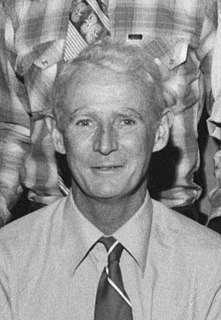
The Country Liberal Party of the Northern Territory (CLP) is a centre-right political party in Australia's Northern Territory. In local politics it operates in a two-party system with the Australian Labor Party (ALP). It also contests federal elections as an affiliate of the Liberal Party of Australia and National Party of Australia, the two partners in the federal coalition.

Clare Majella Martin is a former Australian journalist and politician. She was elected to the Northern Territory Legislative Assembly in a shock by-election win in 1995. She was appointed Opposition Leader in 1999, and won a surprise victory at the 2001 territory election, becoming the first Labor Party (ALP) and first female Chief Minister of the Northern Territory. At the 2005 election, she led Territory Labor to the second-largest majority government in the history of the Territory, before resigning as Chief Minister on 26 November 2007.

A general election was held in the Northern Territory, Australia, on 18 June 2005. The centre-left Labor Party, led by Chief Minister Clare Martin, won a second term with a landslide victory, winning six of the ten seats held by the opposition Country Liberal Party in the 25-member Northern Territory Legislative Assembly, bringing their total to 19. It was the second largest victory in any Northern Territory election. The only larger majority in the history of the Territory was in the first election, in 1974. In that contest, the CLP won 17 of the 19 seats in the chamber, and faced only two independents as opposition.

Greatorex was an electoral division of the Legislative Assembly in Australia's Northern Territory. It was first created in 1990, replacing the abolished electorate of Sadadeen, and was named after Tony Greatorex, the last President of the Legislative Council. Greatorex was a mostly urban electorate, covering an area of 76 km², and encompassing the Alice Springs suburbs of Sadadeen and Traeger Park. There were 4,606 people enrolled in the electorate as of August 2012.
Bernard Francis Kilgariff AM was an Australian politician. He was one of the founders of the Country Liberal Party and served as a member of the Northern Territory Legislative Assembly which included a stint as Deputy Majority Leader. He was elected to the Australian Senate in 1975, and initially sat with the National Country Party until 1979, before sitting with the Liberal Party for the rest of his federal political career.

A general election was held in the Northern Territory on Saturday 4 June 1994, and was won by the incumbent Country Liberal Party (CLP). Marshall Perron continued as Chief Minister.

A general election was held in the Northern Territory on Saturday 27 October 1990, and was won by the incumbent Country Liberal Party (CLP) under Chief Minister Marshall Perron.

A general election was held in the Northern Territory, Australia on Saturday 7 March 1987. Although the incumbent Country Liberal Party (CLP) won a majority under new leader Stephen Hatton, the party's vote was down almost 20 percentage points.

A general election was held in the Northern Territory, Australia on Saturday 3 December 1983. The result was a landslide victory for the incumbent Country Liberal Party (CLP) under Chief Minister Paul Everingham over the Australian Labor Party (ALP) opposition under Opposition leader Bob Collins.

The first general election for the Northern Territory Legislative Assembly was held in the Northern Territory on Saturday 19 October 1974, and was won by the Country Liberal Party (CLP), formed a few months earlier from the merger of the territorial Country and Liberal parties.

A general election was held in the Northern Territory on Saturday 13 August 1977. Though the election was won by the incumbent Country Liberal Party (CLP), the party lost five of its seven executive members. Surprisingly, one of the casualties was Majority Leader Goff Letts—one of the few instances where a major-party leader at any level in Australia lost his own seat. The election also marked the emergence of the Labor Party as a parliamentary force: Labor took six seats in the new assembly.
The 2007 Greatorex by-election was a by-election held on 28 July 2007 for the Northern Territory Legislative Assembly electorate of Greatorex in Alice Springs.
The Northern Territory Legislative Council was the partly elected governing body of the Northern Territory of Australia from 1947 until its replacement by the fully elected Northern Territory Legislative Assembly in 1974.

Godfrey Alan "Goff" Letts is the former Majority Leader of the Northern Territory of Australia from 1974 to 1977.

The 2016 Northern Territory general election was held on Saturday 27 August 2016 to elect all 25 members of the Legislative Assembly in the unicameral Northern Territory Parliament.
Denis Wilfred Collins is a former Australian politician. He was a member of the Northern Territory Legislative Assembly from 1980 to 1997, representing Alice Springs until 1983, Sadadeen until 1990 and Greatorex thereafter. He was first elected as a member of the Country Liberal Party, but lost the preselection to future Chief Minister Shane Stone in 1986 and became an Independent, defeating Stone to win re-election in 1987. A conspiracy theorist, Collins advocated burying guns in the desert in response to the Fabian Socialist World Bank conspiracy. He was defeated in 1994 by CLP candidate Richard Lim.
This is a list of electoral division results for the Northern Territory 2012 General Election.

Lieutenant-Colonel Alfred Lionel Rose,, better known as Lionel Rose or Colonel Rose, was an Australian Army officer and veterinarian who served in both World War I and II. He is best known for pioneering the live cattle trade from the Northern Territory to Asia and curing cattle disease.

The 2020 Northern Territory general election was held on 22 August 2020 to elect all 25 members of the Legislative Assembly in the unicameral Northern Territory Parliament.

Territory Alliance is an Australian political party based in the Northern Territory. It was founded in 2019 by Terry Mills, an incumbent member of the Northern Territory Legislative Assembly and former Chief Minister of the Northern Territory. He had been elected as a member of the Country Liberal Party (CLP). In March 2020, two additional independent MLAs joined the party, Jeff Collins and Robyn Lambley. This saw the Alliance surpass the CLP as the second-largest party in the Legislative Assembly, but failed to gain official opposition status after a secret ballot of non-Government members of the Legislative Assembly instead recognised the CLP in a 5-3 vote. Despite hopes of forming government in its own right, or a coalition with the CLP or Labor in a minority government, the party was left with only one seat following the 2020 Territory election.










